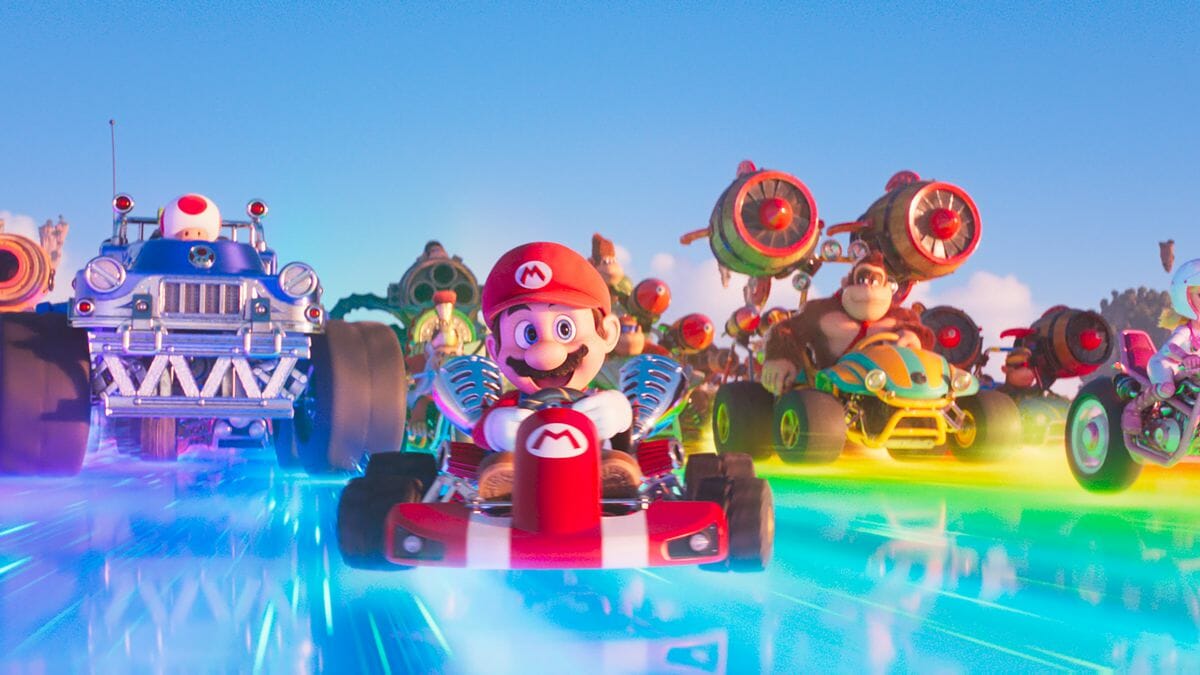Of all the big video game mascots, Mario lends himself to a movie adaptation perhaps the very least. Movies (usually) need characters and a story, two things Mario has done just fine without, thank you very much. Aside from some RPG spinoffs, the games are habitually light on plot. Get to the end of the obstacle course with the little man who controls smoothly and save the princess—any more context and Nintendo would have to hire a narrative lead over another programmer. Mario is more a brand than a character, his face a seal of quality for a tightly designed platformer—less a window to the soul than merchandisable window dressing. And now that face is all over The Super Mario Bros. Movie with Chris Pratt’s voice coming out of it. We may have taken a wrong turn somewhere.
READ ALSO: Read all of Ryan Bordow’s movie reviews here
READ ALSO: Here’s how Arizona film incentives could attract filmmakers
I understand casting Chris Pratt—you want a voice actor who identifies with the character, and Pratt is also more brand than person—but his presence is emblematic of a deeper problem. This isn’t a movie that captures the unique sense of play Mario games engender; it’s a broad-appeal brand deal with big names, old jokes, and the so-tired-it-could-die-in-its-sleep structure of the modern superhero film. That’s why, of all the animation studios, Nintendo partnered with Illumination, the hacks behind the massively popular Minions. The movie is a cash grab—and a really, really bad one.
The story circumvents the games’ lack thereof by merely coasting on by. It’s standard hero’s journey stuff: Mario and Luigi live in ordinary ol’ Brooklyn until they find a portal to the Mushroom Kingdom; Luigi is captured and Mario fixes on saving him; Mario trains with a mentor until he’s ready to save the day. Nothing adventurous, all fine and predictable. At least the roles are switched up—with Luigi as the caged damsel, Princess Peach gets to play the mentor, guiding Mario to newfound abilities and through the complex political threat facing the Mushroom Kingdom (Bowser bad, wants to take over).
Not that any of it matters. The connective tissue between the major plot beats is nonsense. Take the shift from “strange new world” to “ready to fight the bad guy,” for instance: after faffing about to get his bearings, Mario runs into Peach, who’s busy trying to recruit an army for Bowser’s imminent attack—but she inexplicably drops everything to train Mario at an obstacle course. She trusts him implicitly, apparently, because he’s human like her, which the film chalks up to some deliberately vague backstory about Peach being from Earth. It’s a bizarre mix of breezing past plot inconsistencies with a jovial, carefree tone and the busywork of cementing franchise potential through dangling narrative threads, all in the eventual service of a setpiece where Mario jumps between platforms to Bonnie Tyler’s “I Need a Hero.” It doesn’t look too exciting without a player making split-second movement decisions, but the licensed music might remind you of fun times.
That’s the whole movie’s rhythm: nonsensical plot shifts to animated “gameplay” set to cloying needle drops. Mario and Luigi jump through a construction zone to “No Sleep Till Brooklyn,” the gang goes cart racing to “Take On Me,” and the music barely matches the tempo of the action, like an editor had to retrofit the animation around the songs that tested well. Toss in a bunch of eye-rolling punchlines and the sad, tryhard template of a comic-book third act—cheap superheroics in a conveniently empty city and a post-credits tease and all that—and what’s annoying becomes insufferable. The movie is utterly unconcerned with gelling together. So long as there’s room for references to recognize (look, the tanooki suit!), it can Frankenstein together from whatever tired dreck.
Most of the cast got the low-effort memo. Charlie Day, Anya-Taylor Joy, and Seth Rogen—Luigi, Peach, and Donkey Kong, three characters with tons of potential character—just show up and read their lines, and Pratt’s accent is so half-assed that he sounds embarrassed to be there. Jack Black, thank god, is a saving grace, going full silly mode to play up Bowser’s crush on Peach; he even sings a growly love ballad that sounds so on-the-spot improvised—like something from Tenacious D—that it’s creatively out of step with the movie’s otherwise stale humor. Keegan-Michael Key is great as Toad as well: he actually does a voice, for one, and it’s nigh unrecognizable. But these are but small bright spots in a void of lazy material.
The film has its other pleasures, to be fair. The animation is clean, bright, and detailed, and composer Brian Tyler’s interpolations of various Mario themes will be a joy to longtime fans. But there’s a shameless, craven rot at the core of this thing: it got made because Mario is more a brand than a character. It doesn’t even try to shake that impression. And now the main thing his face is good for—a guarantee of quality—is compromised forever.
½ (0.5/5)




